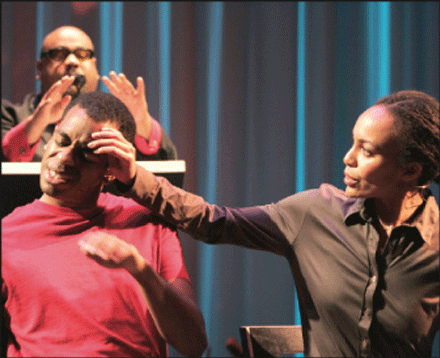By Nicole Davis
“Passing Strange,” the fantastic new musical at the Public, begins in familiar territory for fans of Stew, the singer/songwriter and founder of the rock/pop band The Negro Problem, and the cabaret ensemble STEW. Rotund, black, and dapperly dressed, he takes the stage with his band like a rock star, warming up the audience with the first of many quick-witted lyrics like, “Before we cab it back to your uptown flat, we’re gonna do a little play since you paid for that.” But as the bassist, guitarist, keyboard player and drummer descend partially into the stage, Stew slips into uncharted terrain, where the rock musical and a coming-of-age tale of a young black artist intersect.
Stew takes a seat at a podium-like desk, his station for most of the show, and conjures up the setting: mid-’70s, South Central L.A. The place connotes gangs, crime, and poverty — not the middle-class home of a mother who is trying to drag her Buddhist son to Sunday service, despite his protestations and his Ohmmms. This is where we first meet Stew’s (fictional? autobiographical?) younger self, played by Daniel Breaker, whose name in the production is simply, “Youth,” and his longsuffering, big-hearted mother, whom Eisa Davis touchingly brings to life. As she tries to sway her son to “come a churchin’ wit me!,” Stew wisecracks about her “Negro dialect,” which she slips in and out of at will. It’s the first of many pins Stew pricks into the constructs of black identity and authenticity, always with a sense of wryness and fun.
The boy sees through his mother’s shtick, calling her out for going to that “Christian catwalk” for appearances’ sake. But church, ultimately, is where he ends up, and where he discovers his passion in life: music — followed in short order by sex and drugs. The preacher’s son Franklin, (hilariously played by Colman Domingo, who, like all of the cast members besides Stew, Davis and Breaker, play multiple roles) gets the young boy high, and floats the notion that they’re just black man passing for black. The idea sticks with the Youth, along with Franklin’s advice to go see the world, so that he can find “Le Real.”
The boy boards a plane for Amsterdam, at which point the wall behind the stage, designed by David Korns, lights up in vivid neon, like the carnival that Amsterdam becomes for him. (“Makes Berkeley look like the Bible Belt!” is one of the great lines in one of the show’s countless great tunes, co-written by Stew and Heidi Rodewald.) Here, the Youth gets sidetracked from his path to musical greatness. The only one to wake him out of this haze is his mother, who finally reaches him by phone and asks what could be that important in his life that he could forget to call home. And then it hits him: nothing. He’s been so busy partying, he hasn’t written any songs.
He has better luck in Berlin, where he devotes himself fully to his art, to a fault. To stand out from the post-modern theorists, he changes his backstory from one of whitebread, boring middle-classness to mean-streets gangsterness, making good on Franklin’s earlier comment about passing for black. Everyone eats up his stories, except for those closest to him. Here, in the second half of the second act, is where the Youth’s life lessons begin. As he’s become more obsessed with his art, he’s sunk deeper into his self, failing to connect with his lover, played by Rebecca Naomi Jones, a magnetic presence on stage, and his mother, who pleads repeatedly with him to come home. But the Youth is just too deep inside his head to care… until it’s too late.
The show takes a bit of a preachy turn once the Youth finally does return and realizes how he’s forsaken the people who mattered, namely, his mother. But despite the fact that Stew pushes the audience’s buttons just a little too long, the terrific cast of “Passing Strange” still leads us to a profound place, to reflect upon what we sacrifice in our lives on the path to self-discovery.




































